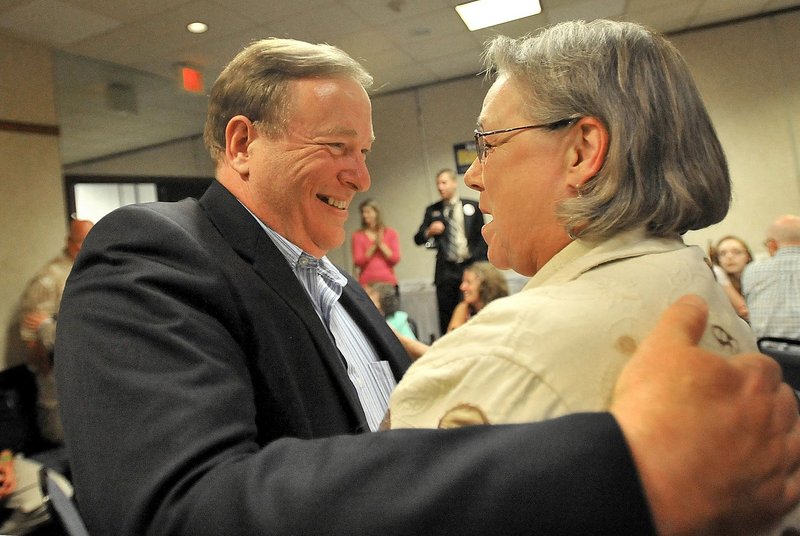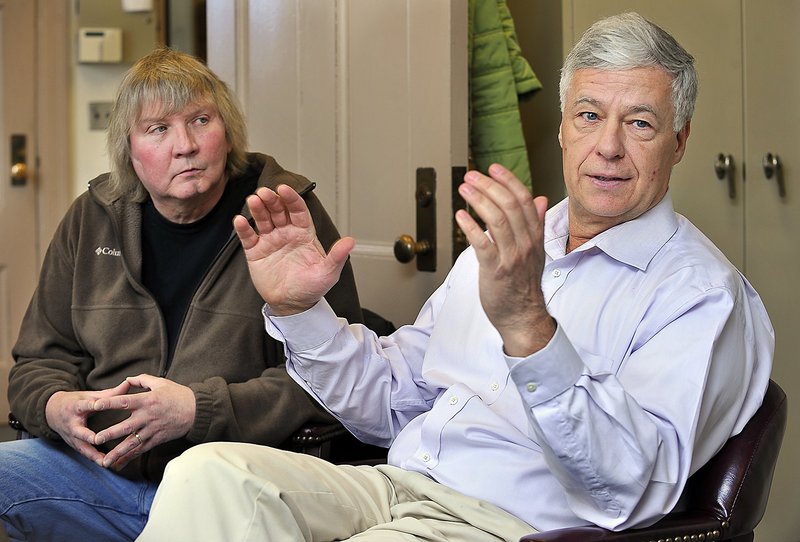BANGOR AND EASTPORT – Here’s a striking thing about the race for Maine’s 2nd Congressional District: the candidates have a remarkable amount in common.
Democratic incumbent Mike Michaud and his Republican challenger, Kevin Raye, both live within a few miles of the rural towns they were born in, and where their families have been for generations. Each became involved in politics at a young age and served as presidents of the state Senate, earning reputations for working across the aisle. Both have had ample tenure in the halls of Congress: Michaud’s been a congressman for 10 years; Raye served as chief of staff to Sen. Olympia Snowe for seven.
Both are moderates who worry about the lack of cross-partisan cooperation on Capitol Hill and the loss of the nation’s manufacturing base. And they’ve squared off for this seat before, in 2002 when Michaud won by a margin of 4 percent.
“They’re both pretty independent men in terms of responding closely to the needs of the Second District, which has a different economy and demographics than (the districts) of their more partisan colleagues around the country,” says Kenneth Palmer, professor emeritus of political science at the University of Maine. “They might be more like each other, except that they are in separate, polarized parties.”
THE MILL WORKER
Michaud is six years Raye’s senior and native to the Millinocket area, where life has long been dominated by paper mills and the great outdoors. Born in 1955, he was the second of six children in a family of French descent. His father and grandfather both worked for more than four decades in the local paper mills.
Raised in Medway, Michaud spent much of his childhood fishing with his siblings and working in the gardens or around the house. At Schenck High School in East Millinocket, he played competitive chess and kept statistics for the basketball team. He told an interviewer from Bates College’s Muskie Archives that, at the time, he “never really got involved in the community,” though he would make up for it in adulthood.
During his senior year, Michaud considered going to college to study criminal justice and become a state trooper, but instead accepted a job at the mill. He would work there for more than two decades.
“I think it was the right decision,” Michaud says now. “You made good money, had good health benefits, and it was the way of life in the Katahdin region for generations.”
He’s described his parents as apolitical: registered Democrats who didn’t become involved until their son did.
“Pretty much Dad went to work early in the morning and he’d come back home after work to be with the family and that’s pretty much it,” he told the Bates interviewer. “They weren’t ones to go out and do a lot of socializing. You know, you worked hard in the mill so you could provide and build a family.”
Michaud says he was prompted to seek office by the thick mats of sludge he watched float down the river from the mill and accumulate in a cove of the Penobscot River near his childhood home.
“It was so polluted and one of the things I realized is that you have to have a balance between jobs and the environment,” he recalls. “So rather than sit back and complain about it, I decided to run for the Maine Legislature.”
It was 1980 and he won on his first try. He’s undefeated in the 15 elections he’s faced since, rising from legislator to state senator to the halls of Congress.
BOY WONDER
Kevin Raye was born in Eastport in 1961 and raised in Perry, where his mother taught elementary school. His father was an electrician and a New Deal Democrat, but all of his grandparents were Republicans active in politics in their town of 800.
Through them, Raye caught the political bug early. He remembers at age 6 being fascinated by his grandmother’s role as a poll watcher, keeping track of who among the Perry party faithful had cast their ballot, and who needed friendly reminding. At 7 he missed school because he’d stayed up watching the televised presidential returns until it was clear Richard Nixon had defeated Hubert Humphrey. Then, at 16, he wrote a letter that would change his life.
In the summer of 1977, the papers reported that a little-known Auburn legislator named Olympia Snowe was considering running for the U.S. House seat being vacated by Bill Cohen.
“So I wrote her this letter,” Raye says with a laugh. “I said, ‘I like politics and I’d like to work on a campaign someday for somebody, but I would need to know where you stand on the issues.“‘ The letter apparently made an impression; Snowe wrote back a four-page, handwritten letter, carefully responding to the teenager’s queries.
Some months later, to his surprise, Snowe called asking if she could meet him the next day.
“I invited her to come to the house the next morning, and asked if she’d like to meet some people from Eastport,” Raye recalls. She said yes, and by the time she arrived the next morning, the 17-year-old had assembled a group of local Republican businesspeople and officials.
“It was my first scheduling gig,” he says with a laugh. Not long thereafter, Raye was appointed Snowe’s Washington County campaign chairman, even though he wasn’t yet old enough to vote. Somehow he convinced several of his friends to spend their free time manning the phones and distributing literature about a candidate few people in the Eastport area had ever heard of.
Snowe won, and Raye would wind up working for her in one capacity or another — campaign worker, Bangor-based staffer and district representative, and chief of staff — for the next 23 years before seeking elected office himself. He wrote his Bates College thesis comparing the initial campaigns of Snowe and Sen. Margaret Chase Smith, and even deferred a semester to work on Snowe’s 1980 campaign.
“Olympia has been an enormously important person in my life,” he says. “The fact that she cared enough to read that letter from some snot-nosed kid changed my life, and that’s not an overstatement.”
STATE HOUSE LEADER
While Raye was in college, Michaud was building influence in Augusta, where he would eventually occupy Maine’s second-highest elected office.
After Michaud was elected to represent the Katahdin region in the Legislature, he was taken under the wing of powerful House Speaker John Martin, D-Eagle Lake. Michaud shared a house with Martin in Augusta for many years and sometimes joined Martin on his annual trips on the Allagash River with future state Supreme Court Justice Elmer Violette. When Martin was otherwise occupied, Michaud would sometimes stand in for him at the House podium.
“One of the things I learned from John: When I sought out his advice he said, ‘Learn the rules,’” Michaud recalls. “I think that’s one of the things a lot of legislators don’t do, to learn the rules to figure out how you can get things done. I also have a lot of respect for John because of the fact that he would work with Republicans as well.”
Michaud kept his vow to clean up the rivers, helping to push through a major reclassification of their water quality ratings. He was elected to the state Senate in 1994 and was named Senate chair of the powerful appropriations committee two years later. From 2000-2002 he was president of the Senate when the body was evenly split between the parties.
“Mike was known as a sort of natural leader in his role as Senate president,” says Palmer, who notes that Raye held the same position a decade later. “It takes a certain stature to hold that job because it’s the number two position behind the governor of Maine. Senators take pains to elect someone to that office who can not only run the Senate, but the state as a whole if it came to that.”
Michaud generally sided with Democrats on labor and economic issues, but often took a more conservative stance on guns and abortion. Other legislators have described him as a workaholic who put in long hours. Former state Senate President Rick Bennett, R-Norway, has said Michaud usually arrived at the State House before anyone else and often left later, too.
“In the Legislature that often makes a great deal of difference,” Bennett — who didn’t respond to interview requests — said in 2004. “You can sort of outlast people.”
After grueling hours in Augusta, Michaud would often drive to East Millinocket to begin weekend overnight shifts at the paper mill, where he worked full time driving forklifts when the Legislature was out of session and had once served as union vice president.
“That was pretty much all my time, spent in the mill or in Augusta, and it does wear on you,” he says. “Ultimately I transferred out to the finishing shop which was a daytime job, which made it a little easier to deal with.”
Michaud is a lifelong bachelor. “I’m married to politics,” he told the Press Herald in 2000. “I really put my heart and soul into it.”
Over the years, however, he saw the forces of globalization undermine the way of life of the people of the Katahdin region, exposing paper workers and other manufacturing and resource extraction industries to what he holds are unfair trading practices and unsound trade agreements. “That’s the reason I ran for Congress,” he says.
Michaud made his first bid for federal office in 2002. His Republican opponent was none other than Kevin Raye.
HILL STAFFER TO STATE SENATE PRESIDENT
Raye had spent the previous 17 years working for Snowe. His first job at her district office in Bangor was helping World War II veterans apply for federal benefits.
“To see that this guy went over and fought and got wounded and everything else and now he’s having a hard time getting disability and going to Togus — it was a very broadening thing to do,” he says. “For a young conservative it made me realize the legitimate role of government. I still don’t like government to be too intrusive. I have that libertarian streak, or at least I call it that, because I don’t think government should meddle in your life about pretty much anything unless you are harming someone else.”
He married Karen Howard while in Bangor. She would later serve as Maine’s Republican National Commiteewoman and is currently a Perry selectman.
The Rayes followed Snowe to Washington, D.C., in 1994 when she was elected to the Senate, and Kevin Raye served as her chief of staff. It was an exciting time — Republicans had just won control of both houses — but seven years later Raye turned 40 and had an existential moment.
“I thought I’d work two years for Olympia and I’d been there 17 years,” he recalls. “I was like: am I going to stay in Washington? I felt like I wanted to come home, and not just back to Maine, but to go all the way home.”
His wife agreed, and in June 2001 they moved from the center of federal power to tiny Perry. They both did political consulting while Raye prepared for a run for the U.S. House. In the first poll he did, Raye had 4 percent name recognition, but he campaigned hard, lived off savings, and won a four-way Republican primary by a few hundred votes.
In the 2002 general election — of which this year’s contest is a rematch — Michaud defeated Raye, 52 percent to 48 percent.
MICHAUD IN CONGRESS
In Washington, Michaud encountered an environment far more partisan than Augusta had been. As a vulnerable first-term congressman, Michaud says, he quickly learned Republicans had received orders not to pass anything he sponsored. Instead, he worked closely with the chair of the veterans affairs committee, Chris Smith, R-N.J., to get laws enacted. “I didn’t care if it had my name on it or not, as long as we got it passed and made a difference for veterans,” Michaud says.
“When Democrats took control, it was the same thing,” he adds, recalling being questioned by more senior Democrats as to why he was hearing Republican-sponsored bills while chair of the health care subcommittee on veterans.
“I said: well, because they might have a good idea,” he says. “I don’t care whose bill it is, I want to move things forward.”
Michaud has championed veterans issues and efforts to clamp down on unfair trade practices, including alleged currency manipulation by China and South Korea.
MUSTARD, STATE HOUSE, CONGRESSIONAL REMATCH
Since the 2002 race, Raye has served four terms representing Washington and eastern Hancock counties in the state Senate.
In 2005, he and his wife became manufacturers, taking over the family’s mustard mill, Raye’s Mustard, allegedly the last traditional stone-grinding mustard operation in the country.
“I’m really concerned — for Maine and the whole country — about the loss of manufacturing,” he says. “Because if you lose the ability to manufacture stuff, I don’t know how you can continue to be one of the most powerful countries in the world. Who’s going to build the next generation of planes or to create the widgets we need? It’s a national security issue.”
Raye was unanimously elected president of the state Senate in 2010, and is generally credited with trying to foster bipartisan cooperation. He and House Speaker Bob Nutting had dinner every Thursday with their Democratic counterparts, Sen. Barry Hobbins and Rep. Emily Cain.
“It’s harder to launch into a partisan attack on somebody if you’re going to break bread with them on Thursday night,” Raye says. “I got to know them. I care about them as people. I like them. And whether or not we agree or disagree on something, that’s just one facet of things that’s missing in Washington.”
“I have to say we’ve had a good working relationship and it was fostered with communication and with individual relationships,” says Hobbins, who served with both Raye and Michaud in the Legislature. “I think Mike and Kevin share a commonality in that they really respect the institutions they serve in.”
Staff Writer Colin Woodard can be
contacted at 791-6317 or at:
cwoodard@pressherald.com
Send questions/comments to the editors.






Comments are no longer available on this story